THE White British will become a minority by the year 2063. The foreign-born and their descendants will become a majority by 2079. And by the year 2100, at least one in five people on these islands will be following the Islamic faith, up from roughly one in every 14 today.
These are just a few of the bombshell findings from my latest research report, which received extensive media coverage.
Population projections are notoriously difficult.
But by drawing on the most reliable census data and using something called the ‘cohort-component’ approach, a standard technique in the study of populations, we can project how the UK population will evolve between today and 2100.
And what we find is that unless there is a radical change of policy, unless the country changes its current direction of travel, then the share of the population that is White British – defined as people who tick ‘White: English, Welsh, Scottish, Northern Irish, or British’ in the most recent census – will collapse over the next 75 years, from over 70 per cent today to below 34 per cent by 2100.
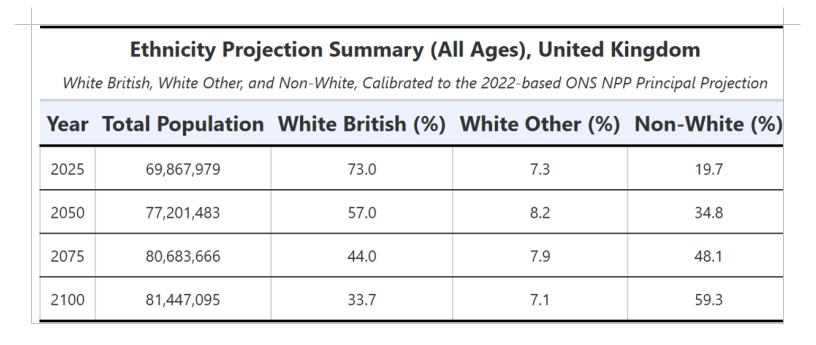
White Britons will become a minority in this country in 2063, just 38 years from now, while among the under-40s, the tipping point will come much sooner, as early as 2050. A white British child who is born today, for example, will already be a minority among peer groups by the age of 25.
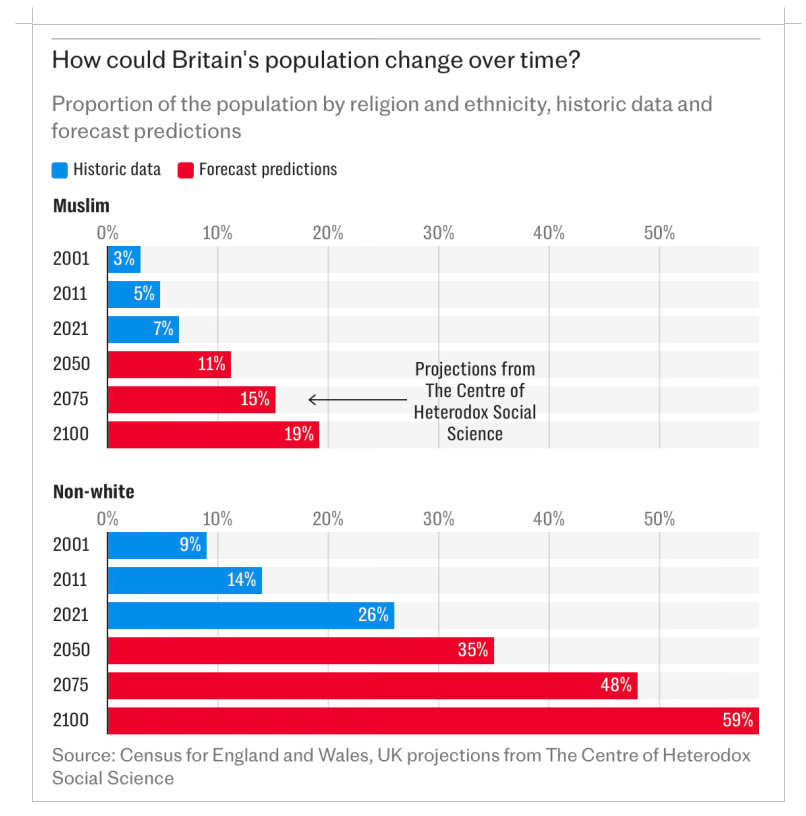
That’s not all.
Alongside these dramatic changes in race and ethnicity, we are also on course to witness some truly profound shifts in citizens’ country of birth.
A country in which most people on these islands today are able to trace their roots back over generations will rapidly make way for one in which most people were born overseas, or to parents who were themselves born overseas.
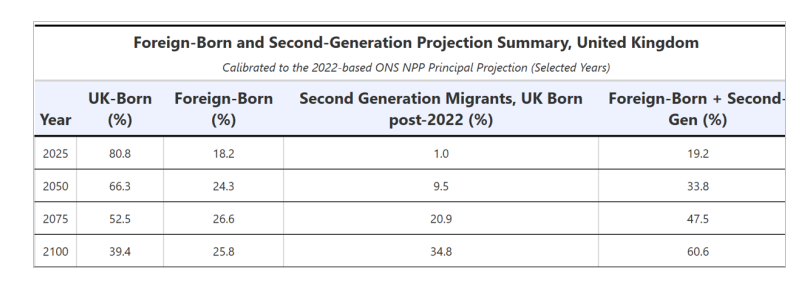
The underlying ties to our nation – in other words to its sense of history, culture, ways of life, identity, collective memory and inheritance – will become much weaker in the decades ahead.
Between the early 2020s and the end of this century, the share of the UK population comprising those who were born in the UK and are not the direct offspring of immigrants will collapse from 81 to 39 per cent, while the share who are foreign-born or the descendants of foreign-born will rocket from 33 to 61 per cent.
What this means is that by the end of this century around six in ten people in this country will either not have been born on these islands, or will be able to trace their roots back only one or two generations.
While some will become ‘British’, this will simply be a much ‘thinner’ sense of Britishness and national identity than what has traditionally defined these islands.
While Britain’s identity will increasingly be reshaped, by its ruling class, around the celebration of ‘diversity’, a rapidly dwindling number of people will actually be rooted in the distinctive identity, history, culture, and collective memory that is ultimately what make these islands distinctive.
The foreign-born and their offspring will become a majority in England in 2079, in Wales in 2081, in Scotland in 2093, and in Northern Ireland some time after 2122.
Yet, once again, this will happen much sooner among the under-40s, with the foreign-born and their descendants becoming a majority among the young in England as early as 2062, just 37 years from now.
This further underlines how the 2060s look set to be a watershed moment in the history of this country, as the white British become a minority and the foreign-born and their descendants become a majority among the under-40s.
Our projections also reveal how the religious identity of the country, too, will be completely transformed, with the Muslim population surging three-fold, from 7 per cent today to over 15 per cent by 2075, and to nearly 20 per cent by the year 2100.
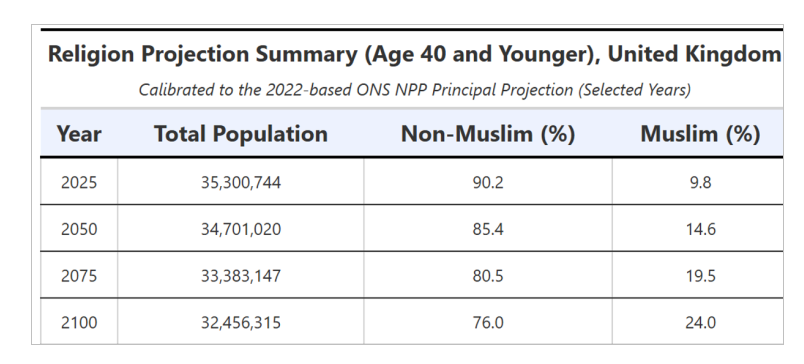
Under an alternative ‘high Muslim migration scenario’, whereby the UK receives greater-than-average in-flows from Muslim states (where the share of net migration that is Muslim is 30 per cent rather than 18 per cent), one in four people will be Muslim by the year 2100, rising to nearly one in three among the under-40s.
We modelled this higher Muslim scenario given the ongoing instability in the Middle East and Northern Africa, and given the fact that Britain’s political leaders have reshaped immigration policy around countries outside of Europe. Today, some 81 per cent of immigration into Britain comes from outside Europe.
All these demographic projections, once again, point to especially rapid and dramatic change among the under-40s, with migrants and minorities tending to be younger.
Look, for example, at how the population will look in the year 2100. By this time, Whites will comprise 28 per cent of young people in England while the UK-born, who are not the immediate descendants of immigrants, will represent only 28 per cent of the population, a little over one in four young people.
By the end of the current century, some 72 per cent of all young people will be non-White, somewhere between one in four and one in three will be Muslim, and a large majority will have been born to people who were themselves not born in the UK.
The United Kingdom, in short, will be completely unrecognisable, having experienced shifts over the next 75 years that are unprecedented throughout its entire history.
Whether the state will be able to manage the pace and scale of these shifts while unifying an increasingly ethnically and religiously diverse population around some kind of shared sense of identity, values and way of life remains an open question.
As is the question of whether it is even possible to unify and maintain a nation-state undergoing this scale and pace of demographic change.
What does look certain is that because of the deliberate policy of mass immigration, imposed by both the Labour and Tory parties, which was then turbo-charged by the post-2019 ‘Boriswave’, the United Kingdom and its people are on course to witness some truly enormous, never-before-seen changes to the fabric of their nation.
By the year 2100, unless things radically change, our immediate descendants will be living in a country in which the White British will comprise only one-third of the population, only four in ten people will have long and strong roots in this country, down from eight in ten today, while somewhere between one-fifth and one-quarter of all people on these islands will be following the Islamic faith.
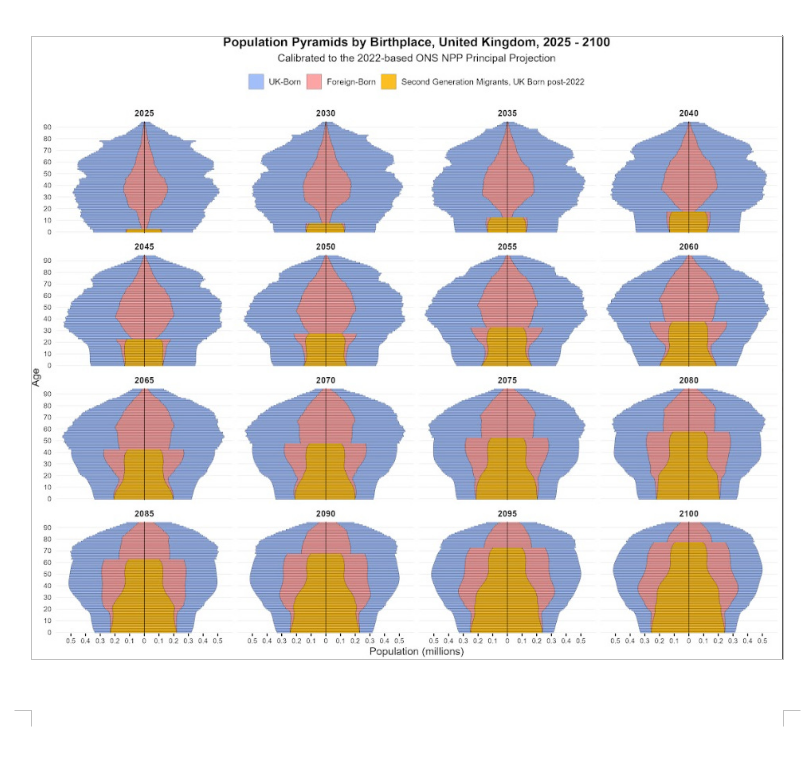
Lastly, it’s worth pointing out that while population projections are complex and should be treated with caution, for the last quarter-century the story has been one of projections underestimating, not overestimating, the scale of change.
So, if we have, for example, another war in Europe, another crisis in the Middle East or Northern Africa, or another prime minister who turbo-charges immigration, like Tony Blair and Boris Johnson, then both the scale and pace of change will be even more dramatic than what we are setting out here.
What we can say today, in conclusion, is that these islands are about to experience a dramatic population transformation that will seriously test, like never before, not only the capacity of the state to manage these changes but the social contract that binds its people to those who rule over them.
The reason I wrote and published this report is because I believe, perhaps like you, that it’s high time our leaders start to think much more seriously about the effects of their very deliberate policies over the last 30 years and how this country is about to be completely transformed.
I just hope this report and the accompanying coverage helps spark that discussion.
TCW Editor’s Note: Paid subscribers can find Matt’s discussion and presentation of the findings on his substack, along with a slide deck and report. If you’re a pensioner, student, emergency worker or military veteran please email Archie at matt@mattgoodwin.org for a discounted subscription.











